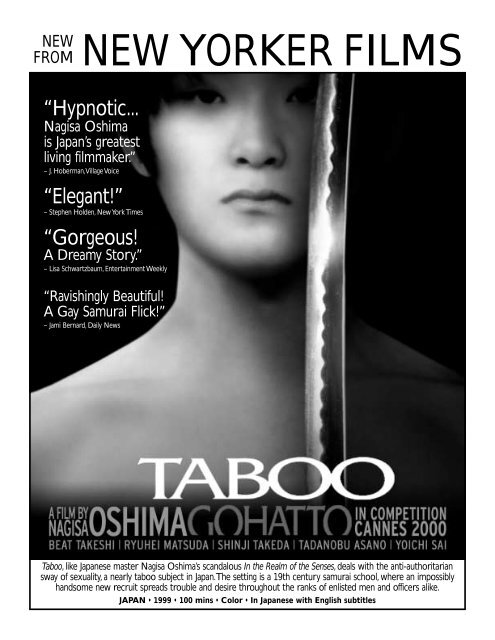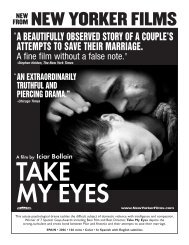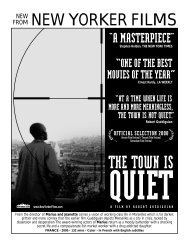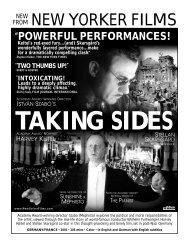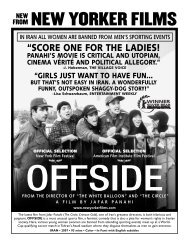Create successful ePaper yourself
Turn your PDF publications into a flip-book with our unique Google optimized e-Paper software.
NEW<br />
NEW YORKER FILMS<br />
FROM<br />
“Hypnotic...<br />
Nagisa Oshima<br />
is Japan’s greatest<br />
living filmmaker.”<br />
– J. Hoberman,Village Voice<br />
“Elegant!”<br />
– Stephen Holden, <strong>New</strong> York Times<br />
“Gorgeous!<br />
A Dreamy Story.”<br />
– Lisa Schwartzbaum, Entertainment Weekly<br />
“Ravishingly Beautiful!<br />
A Gay Samurai Flick!”<br />
– Jami Bernard, Daily <strong>New</strong>s<br />
<strong>Taboo</strong>, like Japanese master Nagisa Oshima’s scandalous In the Realm of the Senses, deals with the anti-authoritarian<br />
sway of sexuality, a nearly taboo subject in Japan.The setting is a 19th century samurai school, where an impossibly<br />
handsome new recruit spreads trouble and desire throughout the ranks of enlisted men and officers alike.<br />
JAPAN • 1999 • 100 mins • Color • In Japanese with English subtitles
FILM REVIEW<br />
Contact Sports<br />
J. HOBERMAN<br />
APRIL 19, 2000<br />
<strong>Taboo</strong>, which has its premiere at the <strong>New</strong> York Film Festival<br />
this weekend, could be considered an event within the event.<br />
Nagisa Oshima is Japan's greatest living filmmaker, and his<br />
first theatrical feature in 14 years is an action film at once baroque<br />
and austere, hypnotic and opaque—a samurai drama punctuated by<br />
thwacking kendo matches in which the romantic swordsmen keep<br />
falling in love...with each other.<br />
Radically reconfiguring two novellas by Ryotaro Shiba, Japan's<br />
bestselling author of historical fiction, <strong>Taboo</strong> (previously billed as<br />
Gohatto) is an appropriately fatalistic, drolly deadpan, and<br />
elegantly precise restatement of the 68-year-old filmmaker's careerlong<br />
concerns. From his aptly named Cruel Story of Youth (1960),<br />
through his <strong>New</strong> Left critique Diary of a Shinjuku Thief (1969) and<br />
his hardcore masterpiece In the Realm of the Senses (1976), to the<br />
unreleased Max, Mon Amour (1986), in which Charlotte Rampling<br />
falls in love and carries on an affair with a chimpanzee, Oshima has<br />
reveled in the spectacle of unleashed sexual frustration<br />
disintegrating the dam of a repressive social order.<br />
One of Oshima's few period films—his last samurai film, the<br />
blatantly subversive Shiro Amakusa, the Christian Rebel, was made<br />
in 1962—<strong>Taboo</strong> is set in 1865, just before the dawn of Japanese<br />
modernization, during the final two years of the Tokugawa<br />
shogunate and its samurai supporters. The movie opens with the<br />
commander of the Shinsengumi militia and his captain (Takeshi<br />
Kitano) selecting new recruits—possibly for their looks as much as<br />
their swordsmanship. The new men include the teenage cutie Kano<br />
(Ryuhei Matsuda) and the somewhat older, confidently strutting<br />
Tashiro (Tadanobu Asano). Scarcely have they been inducted than<br />
Tashiro begins hitting on Kano: "Have you ever killed a man Have<br />
you ever made love"<br />
Like Beau Travail, to which it has a family resemblance, <strong>Taboo</strong><br />
is set in an all-male military universe. But where the Claire Denis<br />
film is a rapt meditation on the erotic obsession that one officer<br />
develops for an individual soldier, <strong>Taboo</strong> is more detached and<br />
analytical in its concern with love's flowering within a highly<br />
restrictive system. The soon-to-be-obsolete samurai are governed<br />
by a strict code of conduct, serving a spy state populated by<br />
informants and characterized by the regulation of dress and decor.<br />
Under the regime of the samurai, homosexuality (repressed or<br />
otherwise) isn't the love that dare not speak its name but, as in<br />
Oshima's last military drama—and <strong>Taboo</strong>'s main precursor—Merry<br />
Christmas, Mr. Lawrence, the only form of sexual passion that<br />
exists. In the end, all the principals seem to "have that leaning," as<br />
the captain is wont to say.<br />
With his provocative bangs and rosebud lips, the enigmatic Kano<br />
is the universal object of desire—a pale, impassive vixen turning<br />
heads as he prances through the ranks. The coy lad is not only<br />
courted by Tashiro and several other samurais but obsessively<br />
observed by the captain, who, after he fights with both Kano and<br />
Tashiro, decides that they are lovers. Kano's otherworldly presence<br />
and Kitano's wryly contemporary performance, full of wheezy<br />
chuckles and bemused twitches, are but two of the subtly discordant<br />
elements Oshima throws into the mix. The film's narrative is<br />
annotated by both voiceover and intertitles; the action is set to<br />
Ryuichi Sakamoto's moody piano loop; the samurais are so<br />
fashionably attired they might have been outfitted by Commes des<br />
Garçons. (Indeed, their dojo's decor anticipates that ostentatiously<br />
underfilled Chelsea emporium.)<br />
Oshima began his career by rebelling against the classicism of<br />
Yasujiro Ozu: "I tried to eliminate completely all scenes with<br />
characters sitting on tatami while talking." Breaking the<br />
filmmaker's own taboo, <strong>Taboo</strong> favors a discreetly classical mise-enscène—balanced<br />
geometric forms, slightly off-center<br />
compositions, a lacquered look, a burnished but muted gray-brownblack-white<br />
palette. (The production design is by the venerable<br />
Yoshinobu Nishioka, responsible for such period classics as Gate of<br />
Hell.) There are numerous ghostly moonlit scenes but, as befits a<br />
filmmaker who programmatically banned "green" from his first<br />
color film, only a single daytime exterior.<br />
Oshima is a visual thinker, and his studio world of painted<br />
sunsets is humanized as a thicket of rumor, innuendo, and jealousy.<br />
Someone starts attacking Kano's real and imagined lovers—<br />
including the sergeant who has been ordered to set Kano straight<br />
and take him out whoring. (The expedition to nighttown is the<br />
movie's comic set piece.) In the end, the leadership decides to<br />
resolve the Kano question by having him fight Tashiro to the<br />
death—a clash by night in a suitably mist-shrouded kabuki-land.<br />
Oshima's films are typically predicated on a mixture of violence<br />
and restraint. (This is most apparent in his ambivalent attitude<br />
toward militarism.) If, as is sometimes said, he is a Marxist, it is of<br />
the Reichian persuasion—the economy that fascinates him is<br />
libidinal. Thus, the seductive Kano may be "evil," but not for the<br />
reasons that the smitten captain imagines. In an offhand and<br />
uncommented-upon aside near the end of the film, the boy admits<br />
that he became a samurai so that he would be free to kill.<br />
Available for rental in 16mm & 35mm to universities, museums & other non-theatrical customers (all dates subject to theatrical approval)<br />
CALL NEW YORKER FILMS TOLL FREE: 1-877-247-6200<br />
16 W. 61st St. <strong>New</strong> York, NY 10023 • Tel. (212) 247-6110 • Fax (212) 307-7855


